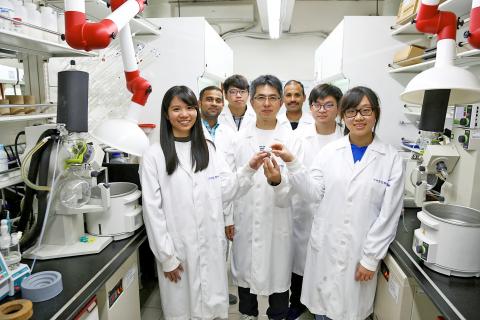Academia Sinica yesterday said that its researchers have developed an antibody testing method for COVID-19 and have made progress synthesizing remdesivir, a medicine that many believe could cure the infection.
The Centers for Disease Control on Tuesday sent serum samples to Academia Sinica of three people who had contact with Taiwan’s first COVID-19 fatality, as part of an effort to determine the source of that infection.
The three had tested negative for RNA viruses, but the centers hoped to discover if they had developed antibodies.

Photo courtesy of Academia Sinica
Test results showed that only one sample had antibodies for COVID-19 and SARS, Academia Sinica Institute of Biomedical Sciences research fellow Lin Yi-ling (林宜玲) said.
The sample was obtained from a Taiwanese businessperson who was not listed as a confirmed case, because their immune system beat the virus, she said.
Little is known about COVID-19, so it is still a mystery whether a person who has recovered from it can contract it again, she added.
The method is useful in tracing the transmission chain of a certain case, Institute of Plant and Microbial Biology Director Wu Shu-hsing (吳素幸) said, but added that testing for RNA viruses tells whether a person contracts COVID-19.
Using molecular biology and genetic engineering, Wu said that she pieced together plasmids — a kind of DNA for expressing antigens — in small templates to make up longer series of plasmids for producing the antigens used to test for COVID-19, SARS and Middle East respiratory syndrome antibodies.
Ordering massive plasmid series from overseas manufacturers takes two to three weeks, Lin said, praising Wu’s team for only needing a week.
After Institute of Biological Chemistry associate research fellow Ho Meng-chiao (何孟樵) purified the nucleocapsid protein of COVID-19 for making reagents, Lin used the western blot method to place the antigens in a serum sample for testing antibody reactions, she said.
Another team led by Institute of Chemistry associate research fellow Chein Rong-jie (陳榮傑) succeeded in synthesizing 100mg of remdesivir in two weeks.
Unable to obtain the raw materials in time, they used materials on hand and molecule synthesis, referencing public-domain literature, to make the drug, which on Thursday was 97 percent as pure as the original, Chein said.
Before the centers tasked them with the mission, Academia Sinica President James Liao (廖俊智) last month formed a task force to speed up the development of antigens, antibodies, drugs and vaccines for COVID-19.
The synthesized drug cannot be used without the consent of the US pharmaceutical firm that manufactures remdesivir, Liao said.
Nonetheless, the achievement showed that Academia Sinica is capable of drug synthesis and could facilitate mass production of the drug after a technology transfer has been completed, he added.

ENDEAVOR MANTA: The ship is programmed to automatically return to its designated home port and would self-destruct if seized by another party The Endeavor Manta, Taiwan’s first military-specification uncrewed surface vehicle (USV) tailor-made to operate in the Taiwan Strait in a bid to bolster the nation’s asymmetric combat capabilities made its first appearance at Kaohsiung’s Singda Harbor yesterday. Taking inspiration from Ukraine’s navy, which is using USVs to force Russia’s Black Sea fleet to take shelter within its own ports, CSBC Taiwan (台灣國際造船) established a research and development unit on USVs last year, CSBC chairman Huang Cheng-hung (黃正弘) said. With the exception of the satellite guidance system and the outboard motors — which were purchased from foreign companies that were not affiliated with Chinese-funded

PERMIT REVOKED: The influencer at a news conference said the National Immigration Agency was infringing on human rights and persecuting Chinese spouses Chinese influencer “Yaya in Taiwan” (亞亞在台灣) yesterday evening voluntarily left Taiwan, despite saying yesterday morning that she had “no intention” of leaving after her residence permit was revoked over her comments on Taiwan being “unified” with China by military force. The Ministry of the Interior yesterday had said that it could forcibly deport the influencer at midnight, but was considering taking a more flexible approach and beginning procedures this morning. The influencer, whose given name is Liu Zhenya (劉振亞), departed on a 8:45pm flight from Taipei International Airport (Songshan airport) to Fuzhou, China. Liu held a news conference at the airport at 7pm,

GRIDLOCK: The National Fire Agency’s Special Search and Rescue team is on standby to travel to the countries to help out with the rescue effort A powerful earthquake rocked Myanmar and neighboring Thailand yesterday, killing at least three people in Bangkok and burying dozens when a high-rise building under construction collapsed. Footage shared on social media from Myanmar’s second-largest city showed widespread destruction, raising fears that many were trapped under the rubble or killed. The magnitude 7.7 earthquake, with an epicenter near Mandalay in Myanmar, struck at midday and was followed by a strong magnitude 6.4 aftershock. The extent of death, injury and destruction — especially in Myanmar, which is embroiled in a civil war and where information is tightly controlled at the best of times —

Taiwan was ranked the fourth-safest country in the world with a score of 82.9, trailing only Andorra, the United Arab Emirates and Qatar in Numbeo’s Safety Index by Country report. Taiwan’s score improved by 0.1 points compared with last year’s mid-year report, which had Taiwan fourth with a score of 82.8. However, both scores were lower than in last year’s first review, when Taiwan scored 83.3, and are a long way from when Taiwan was named the second-safest country in the world in 2021, scoring 84.8. Taiwan ranked higher than Singapore in ninth with a score of 77.4 and Japan in 10th with